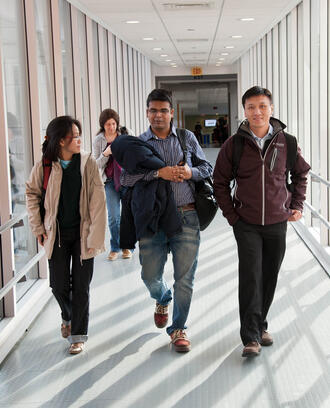MIT Sloan Fellows MBA Program
An MIT SFMBA Roundtable Discussion: Do entrepreneurs need mentors?
Meet the pundits
Michael Chiu, SF ’08: CEO of Kytopen, a biotech company that develops and markets advanced cell engineering solutions. An entrepreneurial leader with extensive experience in building and commercializing new technologies, he has a proven track record in fundraising, product development, and marketing launches. Michael has served as chief technology officer and senior executive at several high-tech companies, including Automation Engineering Inc. (acquired by Mycronic AB), Trophos Energy, and Teradyne.
Patricia Winand Springer, SF ’13 : With 25+ years of experience in the telecom and biotech spaces where she took on leadership roles in sales, client services, supply chain coordination, and operations, Patricia has deep experience managing large teams, improving processes, and growing businesses. In June 2021, after building a career spanning five industries, three continents, and more than 20 countries, she launched her organic spice company Perfeito, which is growing rapidly.
Abhi Yadav, SF ’13: Abhi Yadav is a serial entrepreneur, investor, advisor, and SaaS business executive with a string of successful exits. For the past two decades, his primary focus has been on optimizing growth and customer lifecycles (CX) through AI and data-driven approaches, B2B, and consumer enterprises. The companies that Abhi has launched have collectively generated total revenue of ~$100 million, resulting in billions of dollars in impact.
Tell us a little about your entrepreneurial journey—how did mentors play a role?
Abhi Yadav, SF '13
Abhi: I can’t imagine how I could have forged a career as an entrepreneur without mentorship. In some instances, my mentors have lent their perspectives in areas that were less familiar to me. One of my MIT Sloan Fellows professors, for example, suggested several interesting frameworks for one of my ventures that proved to be crucial counterpoints to my own thinking. In other cases, my mentors have already forged paths as serial entrepreneurs—similar to what I envision for myself—so their experiences affirm and reinforce my own thinking and instincts.
Patricia: I was working in what I thought was my dream job as an executive at a biotech company, but in truth, it was a nightmare. I had 300 people in 15 countries on my team and two personal assistants. I traveled constantly. I seemed to end every day in a far distant hotel drinking wine by myself. I’d spent my life aiming to get to this point, but once there, I realized it was not for me. I had zero quality of life. I left that job for one that was closer to home and started saving up to launch the business I have always wanted to create—Perfeito.
When I was growing up in Brazil, my mother used a special blend of herbs and spices to bring out the flavor of her recipes. I vividly remember the wonderful aroma that would fill the house. I wanted to share that experience with the world. I did my research, launched the company in 2020, and Perfeito is now thriving. I probably would have waited to start the business if not for my husband and his father, both entrepreneurs. They encouraged me to go for it, and go for it I did!
Michael: I was this Midwestern guy who came to MIT for grad school on a fellowship. To be honest, I wasn’t exactly sure why I was there, but I ended up working for exactly the right thesis advisor, Professor Alexander Slocum. Slocum is incredibly creative and dynamic. He gave me the space to explore my interests and opportunities to work with industry on interesting design challenges.
In my second term, I took a course called Management for Engineers taught by Alex d’Arbeloff, the founder of Teradyne. As it happened, d’Arbeloff was funding Professor Slocum’s lab, so I felt compelled to take the class. Well, I’m that annoying kind of person who sits in the front row and asks questions, so he got to know me. He asked me to come to Teradyne to see if there were any interesting problems for me to work on. I quickly learned the technology, but I had zero organizational experience and no idea how to get things done in a big company. After a number of stumbles, I decided that my projects weren’t on a path to success and pitched an in-house startup to get it done. Alex cleared the way. This was my first entrepreneurial spark. I’ve focused on launching new technologies ever since.
What makes a good mentor?
Michael Chiu, SF '08
Michael: A good mentor isn’t overbearing or domineering. A good mentor is an active listener. If you have a problem you’re trying to solve, then you want to go to your mentor and tell your story. If your mentor starts giving you advice before hearing the full story, they are not giving you what you need. You want to be able to describe fully where you’re at and what your issues are. A good mentor says, “I heard you say this. Is that right? These are my thoughts. Is that helpful?”
You then embark on a productive back-and-forth. Of course, sometimes a good mentor is working for you behind the scenes. Alex d’Arbeloff was oftentimes a passive mentor but very important in that role. It took me years to understand how much I learned from him. And he cleared the path for me in ways I didn’t realize until much later. Although he died in 2008, his lessons still come back to me again and again.
Abhi: The mentors I value most are the ones who share my desire for long-term relationships built on regular check-ins and mutual understanding of intentions and expectations. I have a formal mind map I refer to as my “one-five-ten framework” that I communicate to potential mentors to be sure we’re on the same page.
During years one to five of the relationship, I want monthly or quarterly scheduled conversations to keep pace with the evolving landscape of my ventures. When a relationship is well established around year five, I aim for bi-yearly meetups that I use to double down on key items. Looking toward the ten-year horizon of a relationship, I try to add a yearly check-in over lunch, dinner, or a weekend hangout.
Patricia: I think it’s absolutely key to have a mentor from the very beginning to keep you from despairing on the one hand and to keep you grounded and realistic on the other. But good mentors don’t tell you what to do. They point you to alternatives. They make you think and guide you toward the right path. And they are there when you need them. Entrepreneurs have their dark moments. They get discouraged. A mentor can help you see past the present gloom. If you’re a mentor, frank sharing is also important. My husband and his father continually tell me stories of their entrepreneurial wins and losses. I can’t tell you how much I’ve learned from their experiences.
Is it better to have one dedicated mentor or several?
Patricia Winand Springer, SF '13
Patricia: I worked for a long time in the corporate world with a team of people who took care of different responsibilities, but once I turned the key to entrepreneurship, I realized I had to do a lot of that by myself—especially in the early days. I pulled together a team of mentors—really an extensive support system—that I found through dedicated research. Running an organic spice business is not that much different from a pharmaceutical enterprise. The government safety standards are rigorous and require threading endless needles. I was definitely drinking from the firehose.
But here’s the thing—there are many ways to get free help. It’s up to you to find them. I found economic development programs that help female entrepreneurs as well as mentors within those programs. I had considerable support from Cornell Food Ventures at Cornell University. I could call them with questions, and they would help with issues having to do with food manufacturing. And, of course, my husband and his father were invaluable with connections and support.
Michael: No one mentor can give you 100 percent coverage. You need to cobble together mentors over the course of your career in a more organic way. It’s ideal to have a rolling relay of mentors rather than one steady relationship throughout your career. An evolving roster of mentors appropriate to where you are in your career and what you need at a given moment. Throughout my career, I’ve always had a few people in my ecosystem who have gone out of their way to give advice or tell me when I was screwing up. Most important, they were people I could trust, people with whom I could talk through problems. Although they were not mentors per se, each one was there for me at an important time.
Abhi: Having several mentors gives me the opportunity to work with a diverse group ranging from academicians and technologists to operators and serial founders. I have specific touchpoints and objectives I’ve set out for those relationships. Their different outlooks and lenses assure me that I’m less likely to overlook a solution to a particular challenge simply because it isn’t in my training or experience. If you have too many mentors, it’s too much chatter—sometimes with conflicting points of view—and you can feel like you don’t know where you are.
What is the best entrepreneurial advice you received from a mentor?
Michael: Alex d’Arbeloff taught me what it means to be the CEO of a startup. He told me that I needed to look beyond the technical issues and provide vision from a broader perspective. What I learned from him is that leadership by positional power is rarely effective, especially when working with a talented team. The power of rationality and providing a coherent vision is far more effective. Engineers usually find something shiny to focus on, but the CEO must look at the entire picture—the market, the logistics, the dollars and cents. Alex also taught me that the more you know, the more you realize you need to know, so you need to surround yourself with great people.
Patricia: At 85, my father-in-law is a very successful entrepreneur, and I’ve gleaned a lot from him—directly and from the advice he’s given my husband. A long time ago he gave his son a fridge magnet that read, “Sometimes you just have to take the leap and grow your wings on the way down.” It really captures the essence of entrepreneurship in that you have to take risks, and you have to keep honing your skills if you are to fly. He taught me that there are waves of growth—sometimes you take a step back, then suddenly you surge forward. It’s usually not a strictly linear progression. His own father was a successful entrepreneur, so he has had that example and is passing that spirit on to the next generations.
Abhi: One of my favorite pieces of advice came from a mentor whose role is in operations. He told me not to overlook the possibility that a novel problem may best be solved by a tried and true solution. As a counterpoint, he also urged me to consider that an older, more conventional type of problem may well require an entirely new solution.
Are you mentoring other budding entrepreneurs?
Patricia: In particular, my son. Ours is an entrepreneurial family—four generations of entrepreneurs—so it’s natural he would be entrepreneurially inclined. I have brought him into my business, so I have an added impetus to succeed. I want to be an example to him. We actually inspire one another. In a way, it’s reverse mentoring. He is so full of energy and enthusiasm. He’s not risk averse and will say, “Let’s go for this! Why not?!” It’s refreshing to work with someone who doesn’t have historical frustrations. As I create more jobs, I hope to create more opportunities to mentor.
Abhi: Definitely. I try to keep the number at five, that’s my capacity. I want to be able to do justice to each relationship. I select those whose paths are closely correlated to my own because I feel that it’s there that I can provide the greatest value. I see more and more Gen Z entrepreneurs who are so distracted by the noise around them that they can’t focus on the right questions or the correct variables. That’s an area where I can definitely help—guiding them on where and when to focus on what. “Let’s take a step back, why do you want to solve this problem in the first place…and what is the heart of the problem? Think about that first.” Also, I find a lot of mutual mentoring happens with colleagues who are at similar stages in their careers, which is incredibly helpful. That happens a lot among members of my MIT Sloan Fellows cohort.
Michael: I want to add that you can’t proactively mentor someone. They have to come to you open and willing to learn. Unsolicited advice is often neither well received nor useful. Part of my job as a CEO is to mentor those beneath me who are in need of mentorship. If I find people who are looking to grow and receptive to guidance, I try to position myself to be available to them. A few people I have mentored over the last 10 years will call me up and we’ll get together for a meal and catch up. I am there when they need me. Mentorship should be organic and develop into a natural relationship.
What are some of the lessons you’ve learned that you’ll pass on to those you mentor?
Michael: First, choose your market carefully. If it’s a growing market you can take a risk and fail without disastrous consequences. Next, choose your team. You need people around you who are talented in the various areas that are crucial to your business. And finally, choose your idea. Market-team-idea—I have said those exact words to the two dozen young engineers I have mentored over the years. With that strategy, you figure out if there’s money in that market for your great idea. Do you have a team of people skilled at all the specific facets that are required for its success? How sound is your idea? Test it with your mentors! All three have to be right.
Patricia: Maybe the most important advice of all is that entrepreneurs must plan, plan, and then plan some more before thinking about launching any enterprise. In fact, pre-launch research and planning is very often the difference between success and failure.
During the pandemic, I had the chance to conduct research and then was fully prepared when the time came to go full speed ahead. I had a fully developed plan and didn’t have to waste any time figuring out what to do next. Have you thought about immigration issues (if applicable), regulations, filing deadlines? Do you have all your documentation in place? Did you realize that you must be an American citizen to access certain grants and government services? Do you fully understand all the facets of the specific business landscape you’re about to enter? Even if you have the best idea in the world, if you haven’t done your research, your likelihood of failing is high. I’ve seen it happen again and again.
Abhi: I’ve learned a lot about creating and maintaining my mentorship framework by using it to help others. I try to communicate the wisdom of having diverse mentors to my mentee group—currently, three are female founders and two are immigrants to the U.S. I encourage them to develop their own mind maps and frameworks for our interactions. Committing to a structure and being faithful to it are key to reaping the greatest benefits from our relationships. Most of all, I try to encourage them to improve one percent every day—to make that promise to themselves. That achievable dedication to forward motion is essential to successful entrepreneurship.
Patricia: One thing I’d like to add: I feel it’s important to educate those I mentor about the pros and cons of investors—valuable lessons I learned as an MIT Sloan Fellow. It all depends on your goal. For those who want to grow their companies quickly, investors make sense. But if you really identify with your product, if you really care about its future, think twice about investors. In the interest of the bottom line, they might urge you to deviate from your purpose. I am not focused on becoming a billionaire. That’s not what drives me.
What I want is to share an excellent product that can improve the experience of food. I want to be proud of myself, and I want to be proud of my business and its ethical footprint. It’s also about quality of life, taking control of my own time, my own life. So, when I mentor others, I urge them to recognize what their true mission is. Is it to become rich or is it to share something meaningful with the world? Is it about ambition or quality of life? The answers to such questions should influence whether you accept funds from investors. If you are more excited about your idea than making a fortune, I would recommend that you work a regular job and save money for your venture so you don’t do anything rash when you find yourself with dwindling funds. If you conduct your due diligence and save your money, you will have greater control over your venture



